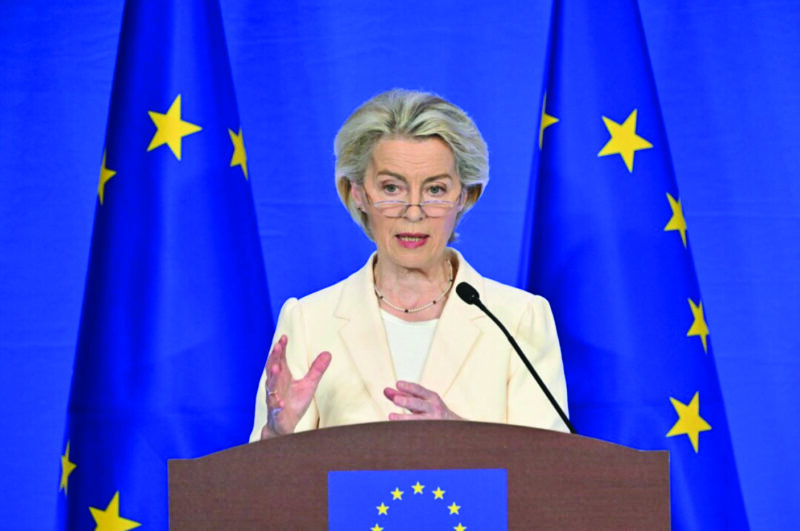By Victoria Friedman
Contributing Writer
Senior figures in the European Union have reacted with a combination of relief and criticism to the new trade deal with the United States.
Immediately following the announcement on Sunday, the European Commission released an official statement on behalf of the commission’s president, Ursula von der Leyen, in which she said the deal created certainty, stability, and predictability in uncertain times for businesses and citizens “on both sides of the Atlantic.”
She thanked U.S. President Donald Trump and called him a “tough negotiator” but also a “dealmaker.”
After months of negotiations, the two sides agreed on a trade deal on Sunday.
The 27-member bloc will buy $750 billion worth of energy from the United States, and tariffs on EU imports, including for automobiles, will be set to 15%.
The deal was struck days before the Aug. 1 deadline, after which nearly all EU imports would have been hit with 30% levies.
Trump and von der Leyen met in Scotland during the U.S. president’s trip to the UK.
When asked whether she considered 15% a good deal for European carmakers, von der Leyen told reporters, “15% is not to be underestimated, but it is the best we could get.”
German Chancellor Friedrich Merz said in a statement on Sunday that he welcomed the deal and that the two trading partners would now avoid an “unnecessary escalation in transatlantic trade relations.”
Merz said his country’s export-oriented economy, with its large automotive sector, would have been hit hard without this agreement.
“We have thus been able to safeguard our core interests, even if I would have certainly welcomed further easing of transatlantic trade,” he said.
Relief But Not Celebration
Not all responses coming out of Europe were as positive.
Belgian Prime Minister Bart De Wever wrote on X on Sunday: “As we await full details of the new EU-U.S. trade agreement, one thing is clear: this is a moment of relief but not of celebration.
“Tariffs will increase in several areas, and some key questions remain unresolved.”
De Wever said that he hoped the United States would “turn away again from the delusion of protectionism and once again embrace the value of free trade — a cornerstone of shared prosperity.”
French Minister for Industry Marc Ferracci similarly criticized the deal for being “unbalanced,” although he acknowledged that it brought stability to businesses and manufacturers.
Ferracci told RTL radio on Monday, “This agreement is unbalanced and should encourage us to continue working to rebalance trade between Europe and the United States.”
The minister said the deal brought the end of uncertainty, which was a relief, but he said “it is not the end of the story.”
French Prime Minister François Bayrou called the deal a “dark day for Europe,” criticizing it as “submission” to Trump in a post on X on Monday.
Hungarian Prime Minister Viktor Orban suggested that the commission president had failed to negotiate a more favorable deal for the bloc, saying Trump had “[eaten] Ursula von der Leyen for breakfast.”
He told the podcast “Warrior’s Hour” on Monday that this was what Hungary expected to happen, because Trump is “a heavyweight negotiator” while von der Leyen “is a featherweight.”
“What I can also say for sure is that the Americans have recently concluded a similar agreement with the UK that’s much better than this,” Orban said. “So the European agreement is worse than the English one.”
Trade Deficit
The Trump administration announced on April 2 that dozens of countries would be subject to reciprocal tariffs to correct what the president has described as the unfair treatment of U.S. exporters.
Those tariffs were meant to come into effect on April 9, but Trump later introduced a 90-day pause, which was then extended to Aug. 1, to allow more time for negotiations.
According to the Office of the U.S. Trade Representative, the United States had a total goods trade deficit with the EU of $235.6 billion last year, a 12.9% increase over 2023.
Other preliminary details of the trade deal with Brussels include a $600 billion investment by the EU into the United States, on top of its current investments.
Steel and aluminum tariffs will remain at 50%, as the United States has applied this rate globally.
So far, the Trump administration has struck tentative trade agreements with China, the EU, Indonesia, Japan, the Philippines and the UK.
Reuters contributed to this report.









